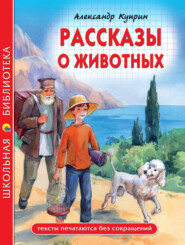По всем вопросам обращайтесь на: info@litportal.ru
(©) 2003-2024.
✖
The Duel
Настройки чтения
Размер шрифта
Высота строк
Поля
“Perhaps they are talking about me,” thought Romashov, not without a certain disagreeable anxiety; but he knew how something pure, chaste, agreeably soothing and benevolent beamed on him from this young woman who, at that moment, made the same impression on him as a charming canvas, the lovely picture of which reminded him of happy, innocent days of long ago. “Shurochka,” whispered Romashov tenderly.
At that moment Alexandra Petrovna lifted her face from her work and cast a rapid, searching, despondent glance at the window. Romashov thought she was looking him straight in the face. It felt as if a cold hand had seized his heart, and in his fright he hid himself behind a projection of the wall. Again he was irresolute and ill at ease, and he was just about to return home, when, by a violent effort of the will, he overcame his pusillanimity and walked through a little back-door into the kitchen.
The Nikoläievs’ servant relieved him of his muddy goloshes, and wiped down his boots with a kitchen rag. When Romashov pulled out his pocket-handkerchief to remove the mist from his eyeglass he heard Alexandra Petrovna’s musical voice from the drawing-room.
“Stepan, have they brought the orders of the day yet?”
“She said that with an object,” thought Romashov to himself. “She knows well enough that I’m in the habit of coming about this time.”
“No, it is I, Alexandra Petrovna,” he answered aloud, but in an uncertain voice, through the open drawing-room door.
“Oh, it’s you, Romashov. Well, come in, come in. What are you doing at the side entrance? Volodya, Romashov is here.”
Romashov stepped in, made an awkward bow, and began, so as to hide his embarrassment, to wipe his hands with his handkerchief.
“I am afraid I bore you, Alexandra Petrovna.”
He tried to say this in an easy and jocose tone, but the words came out awkwardly, and as it seemed to him, with a forced ring about them.
“What nonsense you talk!” exclaimed Alexandra Petrovna. “Sit down, please, and let us have some tea.”
Looking him straight in the face with her clear, piercing eyes, she squeezed as usual his cold fingers with her little soft, warm hand.
Nikoläiev sat with his back to them at the table that was almost hidden by piles of books, drawings, and maps. Before the year was out he had to make another attempt to get admitted to the Staff College, and for many months he had been preparing with unremitting industry for this stiff examination in which he had already twice failed. Staring hard at the open book before him, he stretched his arm over his shoulder to Romashov without turning round, and said, in a calm, husky voice —
“How do you do, Yuri[5 - Yuri = George.] Alexievich? Is there any news? Shurochka, give him some tea. Excuse me, but I am, as you see, hard at work.”
“What a fool I am!” cried poor Romashov to himself. “What business had I here?” Then he added out loud: “Bad news. There are ugly reports circulating at mess with regard to Lieutenant-Colonel Liech. He is said to have been as tight as a drum. The resentment in the regiment is widespread, and a very searching inquiry is demanded. Epifanov has been arrested.”
“Oh!” remarked Nikoläiev in an absent tone. “But excuse my interruption. You don’t say so!”
“I, too, have been rewarded with four days. But that is stale news.”
Romashov thought at that moment that his voice sounded peculiar and unnatural, as if he were being throttled. “What a wretched creature I am in their eyes!” thought he, but in the next moment consoled himself by the help of that forced special pleading to which weak and timid persons usually have recourse in similar predicaments. “Such you always are; something goes wrong; you feel confused, embarrassed, and at once you fondly imagine that others notice it, though only you yourself can be clearly conscious of it,” etc., etc.
He sat down on a chair near Shurochka, whose quick crochet needle was in full swing again. She never sat idle, and all the table-covers, lamp-shades, and lace curtains were the product of her busy fingers. Romashov cautiously took up the long crochet threads hanging from the ball, and said —
“What do you call this sort of work?”
“Guipure. This is the tenth time you have asked me that.”
Shurochka glanced quickly at him, and then let her eyes fall on her work; but before long she looked up again and laughed.
“Now then, now then, Yuri Alexievich, don’t sit there pouting. ‘Straighten your back!’ and ‘Head up!’ Isn’t that how you give your commands?”
But Romashov only sighed and looked out of the corner of his eye at Nikoläiev’s brawny neck, the whiteness of which was thrown into strong relief by the grey collar of his old coat.
“By Jove! Vladimir Yefimovich is a lucky dog. Next summer he’s going to St. Petersburg, and will rise to the heights of the Academy.”
“Oh, that remains to be seen,” remarked Shurochka, somewhat tartly, looking in her husband’s direction. “He has twice been plucked at his examination, and with rather poor credit to himself has had to return to his regiment. This will be his last chance.”
Nikoläiev turned round suddenly; his handsome, soldierly, moustached face flushed deeply, and his big dark eyes glittered with rage.
“Don’t talk rubbish, Shurochka. When I say I shall pass my examination, I shall pass it, and that’s enough about it.” He struck the side of his outstretched hand violently on the table. “You are always croaking. I said I should – ”
“Yes, ‘I said I should,’” his wife repeated after him, whilst she struck her knee with her little brown hand. “But it would be far better if you could answer the following question: ‘What are the requisites for a good line of battle?’ Perhaps you don’t know” (she turned with a roguish glance towards Romashov) “that I am considerably better up in tactics than he. Well, Volodya – Staff-General that is to be – answer the question now.”
“Look here, Shurochka, stop it,” growled Nikoläiev in a bad temper. But suddenly he turned round again on his chair towards his wife, and in his wide-open, handsome, but rather stupid eyes might be read an amusing helplessness, nay, even a certain terror.
“Wait a bit, my little woman, and I will try to remember. ‘Good fighting order’? A good fighting order must be arranged so that one does not expose oneself too much to the enemy’s fire; that one can easily issue orders, that – that – wait a minute.”
“That waiting will be costly work for you in the future, I think,” said Shurochka, interrupting him, in a serious tone. Then, with head down and her body rocking, she began, like a regular schoolgirl, to rattle off the following lesson without stumbling over a single word —
“‘The requisites of “good fighting order” are simplicity, mobility, flexibility, and the ability to accommodate itself to the ground. It ought to be easy to be inspected and led. It must, as far as possible, be out of reach of the enemy’s fire, easy to pass from one formation to another, and able to be quickly changed from fighting to marching order.’ Done!”
She opened her eyes, took a deep breath, and, as she turned her lively, smiling countenance to Romashov, said —
“Was that all right?”
“What a memory!” exclaimed Nikoläiev enviously, as he once more plunged into his books.
“We study together like two comrades,” explained Shurochka. “I could pass this examination at any time. The main thing” – she made an energetic motion in the air with her crochet needle – “the main thing is to work systematically or according to a fixed plan. Our system is entirely my own invention, and I say so with pride. Every day we go through a certain amount of mathematics and the science of war – I may remark, by the way, that artillery is not my forte; the formulæ of projectiles are to me specially distasteful – besides a bit out of the Drill and Army Regulations Book. Moreover, every other day we study languages, and on the days we do not study the latter we study history and geography.”
“And Russian too?” asked Romashov politely.
“Russian, do you say? Yes, that does not give us much trouble; we have already mastered Groth’s Orthography, and so far as the essays are concerned, year after year they are after the eternal stereotyped pattern: Para pacem, para bellum; characteristics of Onyägin and his epoch, etc., etc.”
Suddenly she became silent, and snatched by a quick movement the distracting crochet needle from Romashov’s fingers. She evidently wanted to monopolize the whole of his attention to what she now intended to say. After this she began to speak with passionate earnestness of what was at present the goal of all her thoughts and aims.
“Romochka, please, try to understand me. I cannot – cannot stand this any longer. To remain here is to deteriorate. To become a ‘lady of the regiment,’ to attend your rowdy soirées, to talk scandal and intrigue, to get into tempers every day, and wear out one’s nerves over the housekeeping, money and carriage bills, to serve in turn, according to precedency, on ladies’ committees and benevolent associations, to play whist, to – no, enough of this. You say that our home is comfortable and charming. But just examine this bourgeois happiness. These eternal embroideries and laces; these dreadful clothes which I have altered and modernized God knows how often; this vulgar, ‘loud’-coloured sofa rug composed of rags from every spot on earth – all this has been hateful and intolerable to me. Don’t you understand, my dear Romochka, that it is society – real society – that I want, with brilliant drawing-rooms, witty conversation, music, flirtation, homage. As you are well aware, our good Volodya is not one to set the Thames on fire, but he is a brave, honourable, and industrious fellow. If he can only gain admission to the Staff College I swear to procure him a brilliant career. I am a good linguist; I can hold my own in any society whatever; I possess – I don’t know how to express it – a certain flexibility of mind or spirit that helps me to hold my own, to adapt myself everywhere. Finally, Romochka, look at me, gaze at me carefully. Am I, as a human being, so uninteresting? Am I, as a woman, so devoid of all charms that I deserve to be doomed to stay and be soured in this hateful place, in this awful hole which has no place on the map?”
She suddenly covered her face with her handkerchief, and burst into tears of self-pity and wounded pride.
Nikoläiev sprang from his chair and hastened, troubled and distracted, to his wife; but Shurochka had already succeeded in regaining her self-control and took her handkerchief away from her face. There were no tears in her eyes now, but the glint of wrath and passion had not yet died out of them.
“It is all right, Volodya. Dear, it is nothing.” She pushed him nervously away. Immediately afterwards she turned with a little laugh to Romashov, and whilst she was again snatching the thread from him, she said to him coquettishly: “Answer me candidly, you clumsy thing, am I pretty or not? Remember, though, it is the height of impoliteness not to pay a woman the compliment she wants.”
“Shurochka, you ought to be ashamed of yourself!” exclaimed Nikoläiev reprovingly, from his seat at the writing-table.
Romashov smiled with a martyr’s air of resignation. Suddenly he replied, in a melancholy and quavering voice —
“You are very beautiful.”
Shurochka looked at him roguishly from her half-closed eyes, and a turbulent curl got loose and fell over her forehead.
“Romochka, how funny you are!” she twittered in a rather thin, girlish voice. The sub-lieutenant blushed and thought according to his wont —
“And his heart was cruelly lacerated.”

















